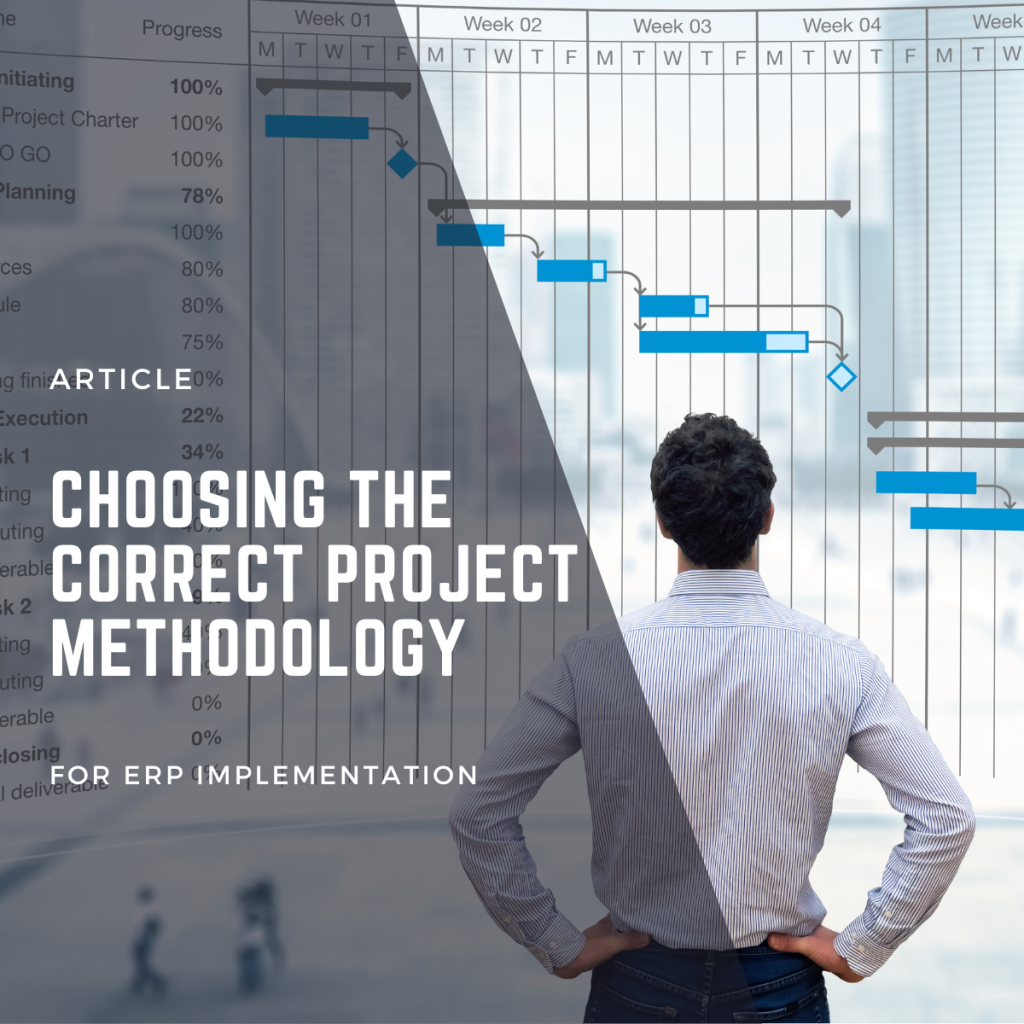Implementing an Enterprise Resource Planning (ERP) system is a monumental task for any organization. It not only involves significant financial investment but also requires a change in business processes, workflows, and often, the organizational culture itself. Given the complexities and challenges involved, selecting the right project management methodology—Agile or Waterfall—is crucial for the success of an ERP implementation. Understanding the key differences between these methodologies can help in making an informed decision.

Agile vs. Waterfall: Key Differences
Agile is all about flexibility, adaptability, and iterative progress. It allows for continuous reassessment and adaptation of plans, making it ideal for projects where requirements may evolve or are not entirely clear at the outset.
Waterfall, on the other hand, is linear and sequential, demanding a complete understanding of requirements from the beginning. Each phase must be completed before the next one begins, with little scope for revisiting earlier phases.
When to Use Which Methodology
The choice between Agile and Waterfall for ERP implementation largely depends on the nature of the project, the organization’s readiness for change, and the clarity of the project requirements.
Greenfield Projects: For organizations implementing ERP for the first time, where many requirements and processes may not be fully understood or defined at the start, Agile could be the more suitable option. Agile methodologies allow for flexibility in defining and refining the system requirements as the project progresses. This iterative approach is beneficial in environments where new needs and challenges can emerge over time.
Evolving Requirements: In industries where rapid change is the norm, or in situations where the specifics of the ERP implementation are difficult to pin down from the start, Agile methodologies offer the adaptability needed to accommodate evolving requirements. This flexibility can be a significant advantage in ensuring that the ERP system remains aligned with the organization’s needs.
Well-defined Processes and Requirements: For projects where the requirements, business processes, and outcomes are clear and well-defined from the beginning, and especially where best practices are well-established, Waterfall could be the better choice. This methodology fits well with implementations where the scope is straightforward, and changes are unlikely or minimal. Waterfall’s structured approach ensures thorough documentation and adherence to predefined stages, making it suitable for projects with strict regulatory compliance requirements or where detailed record-keeping is essential.
Making the Right Choice
Deciding between Agile and Waterfall methodologies for ERP implementation involves considering several factors:
Project Scope and Complexity: The more complex and less defined the project, the more an Agile approach may be beneficial.
Stakeholder Involvement: Agile requires and benefits from continuous stakeholder engagement, which can be a critical factor in ERP projects where user buy-in is essential for success.
Risk Management: Agile allows for earlier identification and mitigation of risks, a significant consideration for projects as substantial as ERP implementations.
Industry Dynamics: Fast-changing industries may necessitate the flexibility offered by Agile, whereas more stable sectors with clear requirements might be better served by the Waterfall approach.
Ultimately, the decision between Agile and Waterfall should align with the organization’s specific needs, culture, and goals for the ERP implementation. In some cases, a hybrid approach that combines elements of both methodologies might even be the best solution, offering the structure of Waterfall with the flexibility of Agile where it’s most needed. The key is to choose a methodology that not only suits the project at hand but also aligns with the broader objectives of the organization, ensuring a successful ERP implementation that delivers value over the long term.
ABOUT THE AUTHOR
With over 20 years of professional expertise in the IT software industry, including an impressive 19-year tenure in a managerial position at IFS Turkey, Göksel Sanbay brings a wealth of experience to the table. Throughout his career, he has successfully managed dozens of hands-on ERP, EAM, and ESM projects, leaving a trail of satisfied clients and successful implementations.
Notably, he has also excelled as a solution architect, leaving his mark on various reference IFS projects. His passion for innovation and driving efficiency has led him to embark on a new journey. In July 2022, he founded GUMA Business Solutions, a dynamic consulting company exclusively dedicated to crafting cutting-edge business software solutions, with a specialization in IFS Applications.
At GUMA, we thrive on challenges and aspire to take businesses to new heights through tailor-made software solutions that streamline operations, boost productivity, and empower growth
